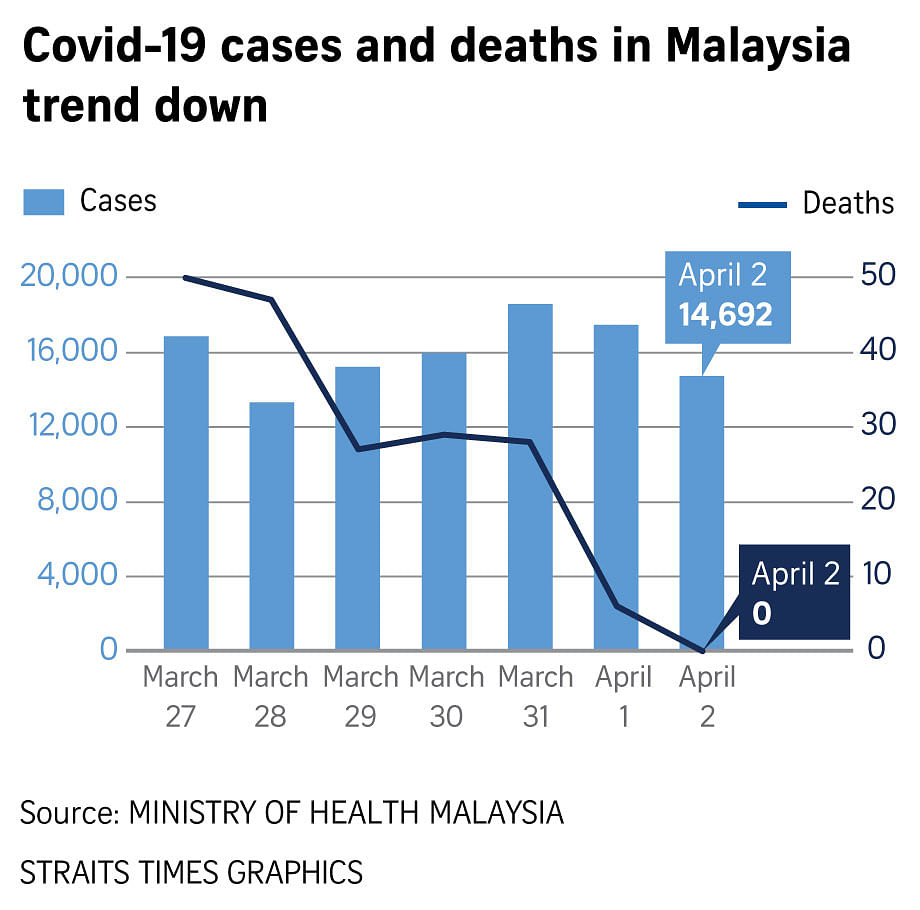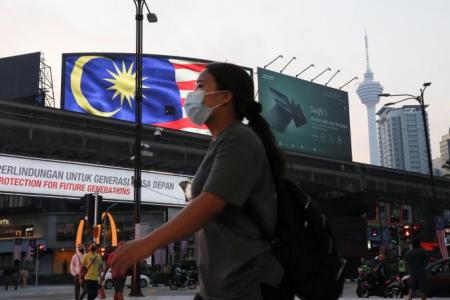Malaysia's Covid-19 cases falling but experts warn against letting guard down
KUALA LUMPUR - Malaysia's transition to treating Covid-19 as endemic is unlikely to spark a healthcare crisis, thanks to a "wall of immunity" against the virus, officials and experts say.
However, eased rules from Friday (April 1) on opening hours, capacity limits and international travel - especially at the Singapore border - could be tightened again if the situation takes a turn for the worse.
"Our greatest fear is when we let our guard down," director-general of Health Noor Hisham Abdullah said last week. "We have put in place the 'heightened alert system' to monitor the situation closely to know when do we relax the restrictions and when do we need to reinstate them if we see cases go up again."
All Covid-19 metrics have been on a downward trend since the mid-March peak of the Omicron wave, with daily cases not surpassing 20,000 for the past week.
Infections and hospitalisations have both dropped by about a quarter in that time, while the death rate has eased by 28 per cent over a fortnight.

This is partly due to the fact that nearly all adults are fully vaccinated, and over two-thirds of them have received a booster shot. Close to four in five of the total population have been inoculated.
"Vaccines have proven to be effectively protective for most individuals in the community from getting severe infections. By looking at the data, we can conclude the current situation is very much different compared with earlier periods when vaccines were still not available," Universiti Putra Malaysia associate professor of epidemiology and biostatistics Malina Osman told The Straits Times.
However, she said special attention is still needed to protect high-risk groups and those who cannot be vaccinated medically.
Although hundreds of thousands are expected to stream across the Johor-Singapore border in coming weeks without prior testing, the southern state's vaccination rate is, in fact, slightly higher than the national average, with 81 per cent of the total population immunised and 68 per cent of adults having received boosters.

Deaths and hospitalisations have also been dropping in Johor, which has one of the lowest per capita infection rates in Malaysia at 14 per 1,000 people in the last week. Selangor, the country's richest state, reported 92 cases per 1,000 people for the same period.
Data has also shown that the high number of infections during the Omicron variant wave is not matched by the number suffering severe symptoms. Despite breaching 30,000 daily cases repeatedly, deaths have largely remained below 100 daily. This compares favourably against last year's deadly Delta variant surge, when daily cases peaked at about 20,000 cases in July and August, but far higher daily death tolls of over 300 cases were reported.
However, health policy specialist Khor Swee Kheng warned that "we do not yet know if this is because it is intrinsically milder, or because Omicron is hitting a 'wall of immunity' of many vaccinated people. This 'wall of immunity' may weaken over time."
A potential risk factor is the Muslim fasting month of Ramadan that started on Sunday, and the Hari Raya celebrations that will follow in May. This will mark the first time since the pandemic hit that large gatherings for prayers, reunions and breaking of fast will be permitted.
Prime Minister Ismail Sabri Yaakob urged Malaysians in a statement on Saturday ahead of Ramadan "to be mindful and continue self-regulating" now that some leeway has been granted.
For now, Covid-19 regulations such as masking up in public places, contact tracing, and isolation of confirmed and suspected cases remain.
Dr Khor told ST: "The road towards Covid-19 endemicity in Malaysia is long and may be filled with new variants or surges of cases, hospitalisations or deaths.
"While the overall trajectory should arc towards living with Covid-19, policies must remain agile and responsive to current health events instead of being fixed and rigid."
Get The New Paper on your phone with the free TNP app. Download from the Apple App Store or Google Play Store now


